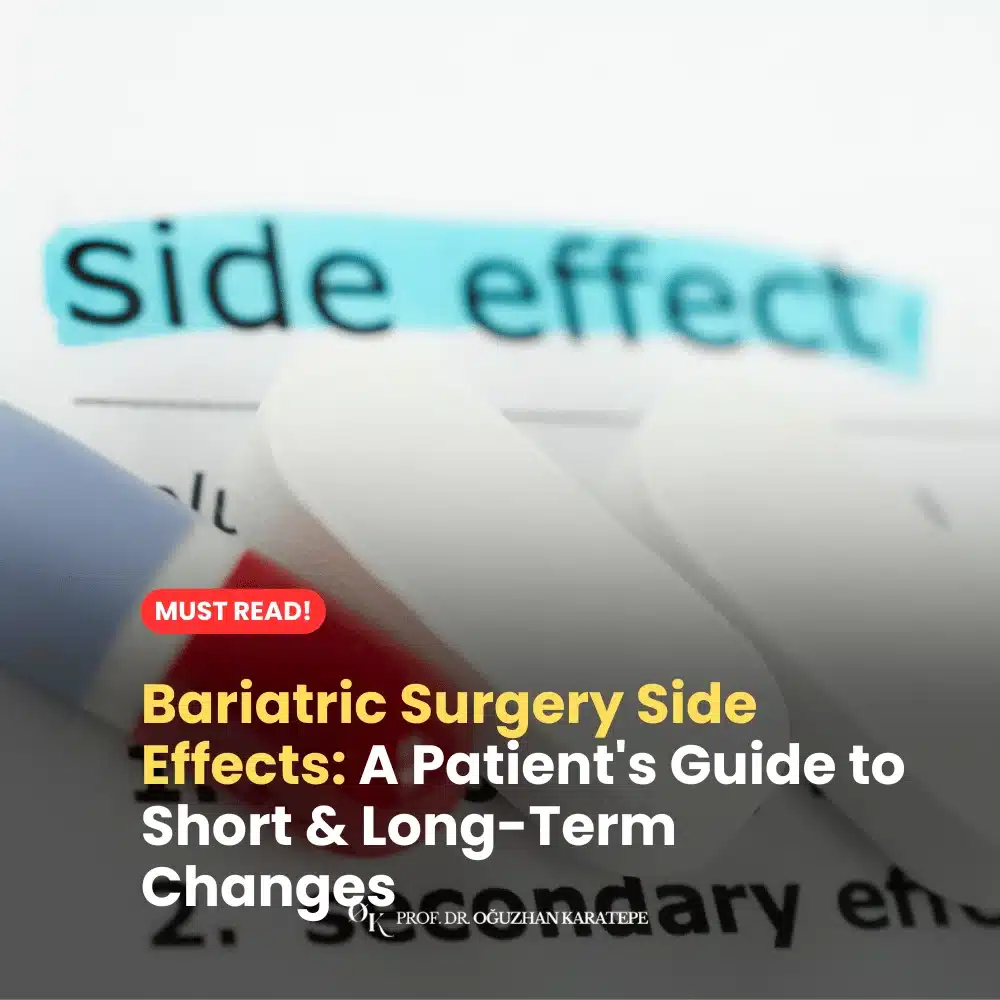Bariatric Surgery Side Effects: A Patient’s Guide to Short & Long-Term Changes
Welcome to our expert guide on bariatric surgery side effects. If you are researching weight loss surgery, it is essential to have a clear, honest, and factual understanding of the entire process. This includes the common changes and adjustments your body will go through after the procedure.
We want to be clear: modern, laparoscopic bariatric surgery (like the gastric sleeve) is one of the safest and most effective medical procedures performed worldwide. Most “side effects” are not dangerous complications, but rather common, normal, and often temporary adjustments to your body’s new, healthier state. Our expert team is here to help you understand what to expect and provide personalized surgical solutions to guide you through every step.
Free WhatsApp Consultation:
Contact us now! 👉 +90 530 489 94 74
Our patıents
Meet Some of Our Patients Who Underwent Bariatric Surgery



Side Effects vs. Risks: An Important Distinction
It is important to distinguish between “side effects” and “risks.”
- Risks (Complications): These are serious, but very rare, medical issues that can occur during or after surgery, such as bleeding, infection, blood clots, or a staple line leak. The risk of these is minimized by choosing a highly experienced, high-volume surgeon.
- Side Effects: These are common, expected changes that your body goes through as it heals and adapts to rapid weight loss. They are generally not dangerous and are a normal part of the bariatric surgery journey.
This page will focus on these common, manageable bariatric surgery side effects. As a surgeon with over two decades of experience, Prof. Dr. Karatepe emphasizes that understanding these adjustments *before* surgery is the key to a calm, confident, and successful recovery.
What are the most common side effects of bariatric surgery?
The most common bariatric surgery side effects are temporary and a normal part of recovery. They include fatigue, feeling more sensitive to cold, temporary hair thinning (3-6 months post-op), and changes in bowel habits. These side effects typically resolve as your weight and nutrition stabilize.
Common Short-Term Side Effects (The First 6 Months)
In the first few weeks and months after your bariatric surgery, your body is doing two big jobs at once: 1) Healing from the procedure, and 2) Adapting to a very low-calorie diet and rapid weight loss. This is a “stress” on the body—a positive stress—that can lead to some common, temporary side effects.
1. Fatigue and Low Energy
This is almost universal. You will likely feel tired, especially in the afternoons, for the first few weeks or months. Your body is directing a huge amount of energy toward healing your surgical sites. At the same time, your calorie intake is at its lowest. This is normal and it *will* get better. As you heal and progress to soft and solid foods, your energy will return.
2. Temporary Hair Loss (Telogen Effluvium)
This is a very common concern, but it is critical to know that it is temporary. This shedding does *not* usually start until 3 to 6 months *after* surgery. It is not caused by the surgery itself, but by the rapid weight loss. Your body intelligently diverts protein and nutrients *away* from “non-essential” jobs (like hair growth) and *toward* your vital organs. This is a normal response called “telogen effluvium.” The hair follicles are not dead, just resting. The shedding slows and regrows once your weight and nutrition stabilize. You can minimize this by hitting your protein goals and taking your vitamins every single day.
3. Feeling Cold
As you lose your body’s “insulation” layer (the fat tissue), you will notice you feel cold much more easily. Your metabolism is also adjusting to a lower calorie intake. This is a very common bariatric surgery side effect. It is a sign the surgery is working! This sensation tends to improve as your body settles at its new, healthy weight.
4. Digestive Changes
Your digestive system is being re-wired. You may experience constipation (due to less food volume and fiber) or changes in bowel habits. Nausea or vomiting can also occur, but they are almost always a “feedback” mechanism—a sign that you have eaten too fast, too much, or have not chewed your food well enough. This is a learning process.
Is hair loss from bariatric surgery permanent?
No, bariatric surgery hair loss is not permanent. It is a temporary shedding condition called telogen effluvium. The hair follicles are “resting,” not dead. Most patients report that their hair begins to regrow and thicken once their weight and nutrition stabilize, usually around 6 to 12 months after surgery.
Free WhatsApp Consultation:
Contact us now! 👉 +90 530 489 94 74
Long-Term Side Effects & Considerations (Lifelong Management)
These are the bariatric surgery side effects that are not temporary. They are permanent changes that you must be prepared to manage for the rest of your life. A good surgical team will give you a clear plan to manage them.
1. Nutritional Deficiencies (The Most Important)
This is an expected and 100% manageable outcome. Because you are eating so much less food (with a gastric sleeve) and/or absorbing fewer nutrients (with a gastric bypass), you *cannot* get all the vitamins and minerals you need from food alone. This is why you must take bariatric-specific vitamins every day for the rest of your life. If you do not, you will develop serious health problems like anaemia, osteoporosis (bone loss), and permanent nerve damage.
2. Acid Reflux (GERD)
This is the most common long-term complaint associated specifically with the gastric sleeve. The new “sleeve” shape is a high-pressure tube, which can cause or worsen acid reflux (heartburn) in some patients. For many, this is mild and easily managed with medication. In a small number of severe cases, a bariatric revision surgery to a gastric bypass (a low-pressure system) may be recommended.
3. Loose Skin
This is a side effect of massive weight loss, not a side effect of the surgery itself. When you lose a large amount of weight rapidly, your skin, which has been stretched, may not have enough elasticity to shrink back down. The amount of loose skin you will have depends on your age, genetics, and how much weight you lose. This is a cosmetic side effect that some patients choose to address with plastic surgery after their weight is stable.
4. Gallstones
Rapid weight loss from *any* method (not just surgery) increases the risk of developing gallstones. As your body breaks down fat, it can saturate your bile with cholesterol, which forms stones. Your surgeon may prescribe a preventative medication, or you may require a simple gallbladder removal procedure in the future.
What is “dumping syndrome”?
Dumping syndrome is a well-known side effect of gastric bypass, but it is very rare with a gastric sleeve. This is because the sleeve preserves the “pylorus,” the natural valve at the bottom of the stomach. Dumping syndrome (nausea, cramping, sweating, diarrhoea) happens when high-sugar foods are “dumped” too quickly into the small intestine, which does not happen with a gastric sleeve.
Why Choose Prof. Dr. Oguzhan Karatepe? (Minimizing Risks, Managing Side Effects)
With over 25 years of experience, thousands of successful cases, and expertise in robotic and laparoscopic surgery, Prof. Dr. Karatepe is a leading figure in gastric sleeve procedures.
Your choice of surgeon is the single most important factor in minimizing your *risks* and helping you manage your long-term *side effects*. A “high-volume” surgeon—one who has performed over 3,000 successful surgeries like Prof. Dr. Karatepe—is statistically proven to have lower complication rates. His mastery of advanced laparoscopic and robotic surgery means your gastric sleeve is performed with the utmost precision.
Furthermore, as a Professor of Surgery with hundreds of academic publications, Prof. Dr. Karatepe is not just a practitioner; he is an academic authority on the long-term metabolic and nutritional changes that follow bariatric surgery. Our program is built on this foundation, providing you with the clear, evidence-based nutritional guidance that is essential to minimize hair loss, manage your diet, and ensure your long-term health. Our expert team is here to help you with personalized surgical solutions that include a world-class aftercare plan.
Which doctor performs bariatric surgery?
Bariatric surgery is performed by a bariatric surgeon, who is a general surgeon with specialized fellowship training in weight loss procedures. When choosing, you must look for extensive experience (1,000+ surgeries), board certification, and a surgeon who operates in an accredited (e.g., JCI) hospital.
Free WhatsApp Consultation:
Contact us now! 👉 +90 530 489 94 74

Frequently Asked Questions (FAQ) About Bariatric Surgery Side Effects
Q: What is bariatric surgery?
A:Bariatric surgery is the medical term for weight loss surgery. It is a group of procedures, like the gastric sleeve, that help you lose weight by making changes to your digestive system’s size and hormones.
Q: Is hair loss permanent after gastric sleeve?
A: No. Gastric sleeve hair loss is not permanent. It is a temporary shedding condition called telogen effluvium. The hair follicles are “resting,” not dead. Most patients report that their hair begins to regrow and thicken once their weight and nutrition stabilize, usually around 6 to 12 months after surgery.
Q: Can bariatric surgery cause acid reflux?
A: The gastric sleeve can, in some cases, cause new or worsened acid reflux (GERD) because it is a high-pressure tube. This is often manageable with medication. The gastric bypass, on the other hand, is a *treatment* for acid reflux.
Q: Will I feel cold all the time after bariatric surgery?
A: You will likely feel more sensitive to cold, especially in the first 6-12 months. This is a common side effect of rapid weight loss as you lose your body’s “insulation” layer. This sensation typically improves as your weight stabilizes.
Q: Can bariatric surgery cause addiction transfer?
A: This is a known psychological risk. “Addiction transfer” is when a patient replaces their “food addiction” or compulsive eating with a new compulsive behaviour, such as alcohol use or gambling. This is why a psychological evaluation is a key part of the bariatric surgery requirements.
Q: What are the most serious *complications* (not side effects)?
A: Serious bariatric surgery complications are rare (under 1-2% with an experienced surgeon). The most serious risks are surgical-site issues like a staple line leak, bleeding, or blood clots. This is why choosing a high-volume, expert surgeon is so important.
Q: Can I drink alcohol after bariatric surgery?
A: You must wait at least 6-12 months. After surgery, your body will absorb alcohol much faster, and you will become intoxicated on a very small amount. This is a serious side effect to be aware of. Alcohol also provides “empty calories” that can slow your weight loss.
Q: What is the side effect of not taking my vitamins?
A: This is critical. Not taking your bariatric vitamins will lead to serious illness. The side effects of nutritional deficiency include severe fatigue (from anaemia), bone and tooth loss (from calcium/Vit D deficiency), and permanent nerve damage (from B12 deficiency).
Q: Does bariatric surgery cause constipation?
A: Constipation is a common side effect, especially in the first few months. This is due to the low-fiber liquid diet, increased protein, and lower overall food volume. This is typically managed by increasing your water intake and using a fiber supplement once your surgeon clears you.
Q: Will I have loose skin?
A: Loose skin is a very common side effect of *massive weight loss* (from any method), not a side effect of the surgery itself. The amount of loose skin you have will depend on your age, genetics, and total weight lost.
Legal Disclaimer
This information is for general educational purposes only and is not a substitute for professional medical advice. For personalized treatment plans, please contact Prof. Dr. Oguzhan Karatepe directly.
Contact Us Today
Our expert team in bariatric surgery is ready to assist you. If you have more questions about bariatric surgery side effects or wish to schedule a consultation, please reach out to us for a transparent, no-obligation discussion.
Free WhatsApp Consultation:
Contact us now! 👉 +90 530 489 94 74
How can I book an appointment?
You can contact us directly via phone, WhatsApp, or by filling out the online contact form on our website. Our dedicated patient coordinators will be happy to schedule your free consultation with Prof. Dr. Karatepe.
